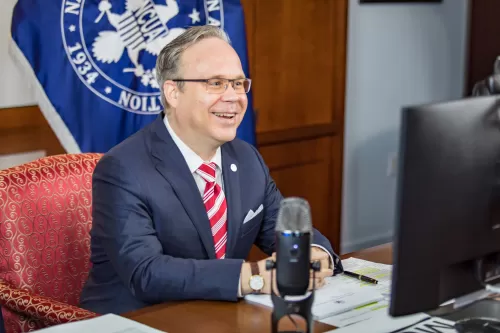NCUA Chairman Todd M. Harper delivers remarks remotely from the NCUA's headquarters in Alexandria, Virginia.
As Prepared Delivery on December 16, 2021
Let me begin by expressing my thanks to everyone involved in developing and finalizing the recommended NCUA 2022–2023 Budget. Thank you, Eugene, Melissa, Jim, and the entire team in the Office of the Chief Financial Officer as well as the Office of the Executive Director. A tremendous amount of work was done by all.
I am also very appreciative of my fellow Board members and their teams. Their willingness to engage with me in good-faith discussions about each of our priorities helped us to reach the consensus in the recommended budget before us today.
And, last week the Board held a public hearing on the 2022–2023 staff draft budget and received testimony from four groups. Additionally, NCUA received six comment letters on the staff draft budget. That input is integral to our annual budget process. Thank you to all who participated and provided that feedback. Notwithstanding the tight timeframe, be assured that the NCUA team carefully reviewed and considered your comments and testimony and incorporated some of your suggestions in the recommended budget.
As I noted earlier, the recommended budget we are considering today is a consensus product that evolved from the staff draft. Compared to the overall funding and staffing levels shown in the staff draft budget, the budget we are considering is smaller in dollars and full-time equivalents, but it still achieves the important goals of protecting credit union members, maintaining the safety and soundness of the credit union system, and safeguarding the Share Insurance Fund.
As Eugene noted in his presentation, the recommended overall total budget — including the Operating Budget, the Capital Budget, and the Share Insurance Fund Administrative Budget — is $339.5 million and 1,196 FTE. This final budget also reflects a carryover of $23 million of unspent 2021 budget funds for the Operating Budget. Together, the total budgets with the carryover, the agency will increase spending by 4.1 percent in 2022 compared to the 2021 budget, an amount lower than the present rate of inflation.
Additionally, under this budget, the Operating Fee collected from federal credit unions would be further reduced by $15 million due to accumulated cash exceeding funding needs. This reduction to the Operating Fee lowers the amounts that will be invoiced to federal credit unions for the annual Operating Fee collection due April 15, 2022. I know that this issue was very important to Board Member Hood, and I appreciate his steadfast focus on this matter.
Other highlights of the recommended budget include more resources for small credit unions. This was a high priority for me. Small, low-income, and minority credit unions are vital to the continued health of the credit union system and are often the only providers of safe, fair, and affordable financial services in communities of color, underserved areas, and rural communities.
And, while we have resources dedicated to supporting low-income and minority credit unions, in recent years we have pared back our assistance for small credit unions. This budget reverses that trend by adding three examiner positions — one per region — in the recommended final budget to support the needs of small credit unions. In 2022, staff will also conduct a study and consider options for further supporting small credit unions in the future.
Additionally, I remain deeply committed to strengthening the NCUA consumer compliance and fair lending programs to ensure that all consumers receive the same level of protection regardless of their financial provider of choice. While I would have liked to increase our fair lending resources by more, the recommended budget includes two additional staff to expand the NCUA’s fair lending program.
Existing resources allow for only 30 fair lending exams a year. Additional exams and other touch points are needed because we continue to uncover fair lending violations. Additional resources will allow us to ensure that the credit union system lives up to its ideal of people helping people by ensuring the fair treatment of all consumers.
The NCUA COVID-19 response will continue to be a focus for the agency in 2022. Almost two years into the pandemic, the NCUA remains focused on keeping its employees and contractors safe, so that we can continue to perform mission-essential functions. We have pragmatically and expeditiously addressed the economic fallout within the credit union system by providing appropriate regulatory flexibility, and we will continue to do so.
On cybersecurity, we all remain deeply vigilant about the risks that cyber-attacks pose to our financial system. We will continue to mature and strengthen our cybersecurity program and make it appropriately transparent under this budget.
Finally, we must remain vigilant when it comes to safety and soundness. With the expiration of pandemic-relief programs, more households will come under financial stress next year. And, that stress can lead to credit defaults at credit unions. To best protect the system and the Share Insurance Fund, the recommended budget maintains the current exam program, which allows for extended exams at well-run credit unions with less than $1 billion in assets. Maintaining at least the current exam policy was critical to gain my support for the final budget.
In conclusion, it was a pleasure to work with my fellow Board members and their senior policy advisors, as well as the agency’s budget staff, to find the common ground between us on this recommended 2022–2023 budget. This final budget does not give us everything we wanted, but it does give us everything we needed. I look forward to a productive 2022.
That concludes my opening remarks. Vice Chairman Hauptman?




